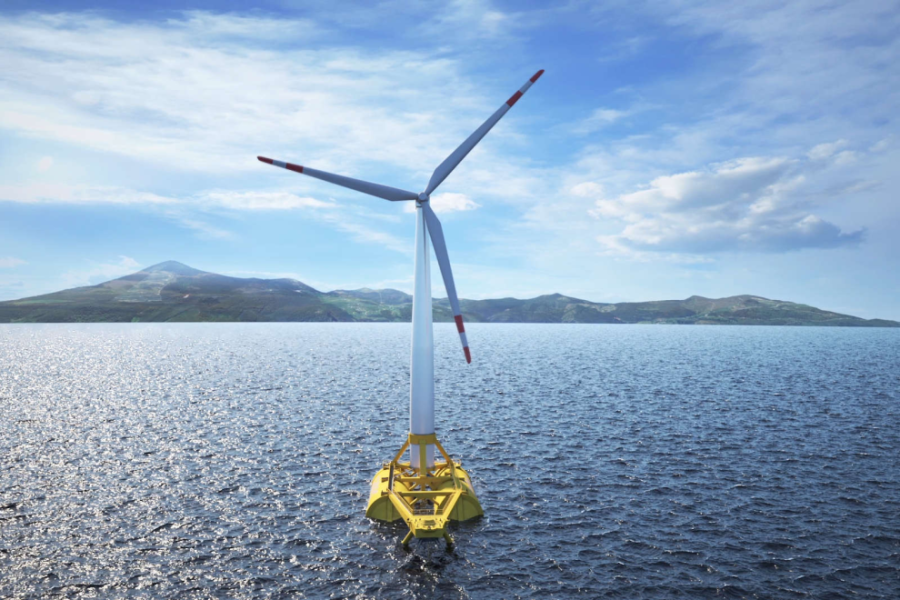Business
Offshore wind could power economic growth

UPTO 5,300 new jobs and up to £1.4 billion could be generated for the UK economy by galvanising the supply chain and infrastructure opportunities arising from the development of new floating wind farms.The independent study, The Celtic Sea Blueprint, conducted by Lumen Energy & Environment, looked at the minimum requirements needed to deliver the first three projects outlined by The Crown Estate in December.
It also examined the gaps, such as ports deep enough for handling the giant turbines, vessels to service the sites, and export cables to transport electricity to land.
Addressing these gaps will be critical to establishing these first windfarms, and, with a further pipeline of windfarms expected in the region and rising global demand, the opportunities for ports, manufacturers and the wider supply chain could be far greater.
Action is required now, locally and nationally, to capture the opportunities associated with this fast, growing, innovative new technology. The first three floating wind farms, which will be able to generate up to 4.5GW of electricity – enough to power more than four million homes, will be some of the largest in the world.
And, as the first in the UK outside of Scotland, it marks a new phase for offshore wind in England and Wales.
The South West/Wales has the potential to be at the forefront of driving this development with opportunities from port infrastructure to significant SME support across the supply chain.
In particular, the research highlighted opportunities for the region, from assembling the large floating platforms needed to house the turbines to building on the existing local high-skilled welding and concrete expertise and local suppliers.
It highlighted opportunities for local ports across the region from the assembly, transport, and storage of parts during the construction and life-cycle of the sites.
At the same time, the region’s strong shipping expertise could also benefit during the development stages.
Gus Jaspert, Managing Director of Marine at The Crown Estate, said: “Floating wind is an incredibly exciting opportunity for the region and the nation. It will boost clean electricity generation by unlocking the deeper waters of the Celtic Sea not previously accessible by fixed turbines and providing greater access to wind blowing from the west.
“The benefits, though, are even more wide-ranging. They open up wider local and national opportunities for manufacturers and the supply chain, from cables to platform construction to port development, creating thousands of new jobs and skills.
“But there are also gaps in the market.
“If the UK is to make the most of the economic and environmental opportunities from the transition to renewable energy, we must be on the front foot. We must act now to develop the supply chain capability, skills and infrastructure needed to establish these windfarms and future floating windfarms in the Celtic Sea and elsewhere.
“We want to work with the industry, trade organisations, local communities and across governments to ensure we are harnessing all the available opportunities and supporting the UK in continuing to accelerate its world-leading position in offshore wind.”
RenewableUK’s Chief Executive Dan McGrail, Co-Chair of the Floating Offshore Wind Taskforce, said: “The Celtic Sea Blueprint shows that floating wind can deliver immense industrial growth.
“Some of the world’s biggest floating wind farms will be built in the Celtic Sea, with turbines twice as tall as Blackpool Tower, platforms the size of football pitches and hundreds of kilometres of hi-tech cables.”
Jess Hooper, Director for RenewableUK Cymru, added: “Manufacturing is part of the Welsh national story. We have a proud industrial work heritage, a skilled manufacturing base, and strong links with the universities and colleges that feed into this industry.
“Retaining, upskilling and transitioning our local workforce towards offshore wind is the biggest opportunity to provide high-quality employment for decades to come.
“Only by developing our port capabilities in South Wales can we do this.
“Our ports are paramount in attracting the right anchor companies to safeguard against project delivery bottlenecks and develop our local supply chain capabilities.
“Investment in the region now is critical to delivering on that 4.5GW of offshore wind at the scale and pace required to meet our net zero targets.”
The Crown Estate is now focused on bringing key parties together to create an action plan for developing supply chain and infrastructure capabilities in the region and across the UK.
The Crown Estate has invested in extensive spatial planning and surveys to map the environmental and physical properties of the wind farm sites, conducted environmental assessments and begun work with the Electricity System Operator on connections to the UK’s energy grid up front in the process.
It will also introduce a series of contractual commitments for developers to help drive positive social and environmental impacts for the region focused on jobs, skills and training, environmental benefits and working with local communities.
The formal tender process for the floating wind farms starts at the end of the month.
Business
Cardiff airport investment under fire as Qatar link stalls despite £400m public backing

Ministers admit no meetings with airline that once received Welsh Government marketing support
THE FUTURE of Cardiff Airport’s long-haul ambitions has been thrown back into the spotlight after Welsh ministers admitted they have not personally met Qatar Airways executives — despite the airline once operating the airport’s flagship international route and benefiting from a publicly funded marketing partnership.
The admission has prompted fresh questions over whether taxpayers are getting value for the almost £400 million of public money that has been invested in the airport since it was bought by the Welsh Government in 2013.
South Wales Central Conservative MS Andrew RT Davies said the lack of direct engagement was “unacceptable”, arguing that ministers had failed to prioritise restoring one of Wales’ most important global connections.
In written questions to Economy Minister Rebecca Evans and Transport Minister Ken Skates, he asked how many times they had met Qatar Airways since August 2024.
Both confirmed they had not held any meetings.
Ms Evans said commercial negotiations are led by the airport’s executive team and added she would “very much welcome” the route’s return when the time is right.
Mr Skates said responsibility for the airport sits outside his portfolio and declined to comment further while discussions are ongoing.

Flagship route
Qatar Airways launched daily flights between Cardiff and Doha in 2018 to considerable fanfare.
At the time, ministers described the service as “transformational”, linking Wales directly to one of the world’s biggest aviation hubs and providing one-stop access to more than 150 destinations across Asia, Australia, Africa and the Middle East.
Business groups said the route would make Wales more attractive to inward investors and exporters, while tourism chiefs hoped it would bring higher-spending international visitors.
To promote the link, the Welsh Government entered into a two-year marketing partnership with the airline, understood to be worth around £1 million, aimed at raising Wales’ profile overseas and encouraging travel through Cardiff.
The agreement funded joint advertising and promotional campaigns in international markets.
However, the route operated for less than two years before being suspended at the start of the Covid-19 pandemic in 2020.
While Qatar Airways has since restored flights to other UK airports including Heathrow, Manchester and Birmingham, Cardiff remains the only former UK destination where services have not resumed.

Value for money questions
The situation has reignited debate over whether the public investment delivered lasting benefits.
Critics say the combination of direct airport funding and marketing support should have secured a more sustainable presence from a global carrier.
They question whether the advertising partnership represented value for money if the route ultimately disappeared and has yet to return.

For some observers, the absence of Qatar has become a yardstick for judging the success of government ownership.
After more than a decade and hundreds of millions of pounds in loans and support, they argue, Wales should be seeing stronger international connectivity rather than retreat.
Supporters counter that the pandemic severely disrupted aviation worldwide and that rebuilding routes takes time, particularly for smaller regional airports.
They also note that commercial airline negotiations are typically handled by airport management rather than ministers.

Passenger recovery
Cardiff Airport was purchased by the Welsh Government for £52m to prevent its closure and safeguard jobs.
Since then it has required repeated financial support packages to maintain operations and invest in infrastructure.
Passenger numbers remain below pre-pandemic levels, and the airport continues to compete with Bristol, which offers a far wider range of routes and attracts many Welsh travellers across the border.
Industry analysts say long-haul services such as Doha are especially important because they connect regions directly to global markets without relying on London hubs.
Without them, airports risk being seen as secondary or feeder operations.
Political pressure
Mr Davies said the government needed to show greater urgency.
“Senedd ministers have ploughed almost £400 million into Cardiff Airport since they bought it – yet they haven’t even bothered to meet with a major airline to re-establish a crucial international link,” he said.

“When that level of public money is involved, people expect leadership.
“Getting flights back should be a priority.”
The Welsh Government maintains it remains supportive of restoring the route and says talks with Qatar Airways are continuing through airport executives.
But for many travellers and businesses, the key question remains simple: after years of investment and promises, when will Wales once again have a direct long-haul link to the world?
Until Qatar — or another global carrier — returns, critics say, that question will continue to hang over Cardiff Airport’s future.
Business
Croeso awards return to celebrate Pembrokeshire’s tourism stars

Colin Jackson to host major industry night as entries open for 2026 event
THE CELEBRATION of Pembrokeshire’s tourism and hospitality sector is officially underway as the Visit Pembrokeshire Croeso Awards return for 2026 after a two-year break.

The prestigious awards, designed to recognise businesses that go above and beyond to deliver exceptional visitor experiences, are back with what organisers describe as “fresh energy and renewed ambition”.
This year’s ceremony will be hosted by Welsh sporting legend Colin Jackson CBE, the Olympic silver medallist and former world champion hurdler, who will act as compère for the evening.
The awards will take place on Thursday (Oct 29), bringing together leading hotels, attractions, restaurants and tourism operators from across the county for a night of celebration and recognition.

Seventeen categories are open for entry, including Best Hotel, Best Place to Eat, Accessible & Inclusive Tourism Award and Rising Star, highlighting both established operators and emerging talent within the industry.
Organisers say the event is not only about rewarding excellence, but also about developing the next generation of hospitality professionals.
At the heart of this year’s ceremony is a partnership between Pembrokeshire College and the Celtic Collection. Students will gain hands-on experience in staging a live, large-scale event, working alongside front-of-house teams and industry specialists to plan and deliver the evening.
The collaboration aims to give young people practical skills while supporting the long-term future of the county’s tourism sector.
Emma Thornton, Chief Executive of Visit Pembrokeshire, said: “We are very excited to be launching our 2026 Croeso Awards building on our 2024 event through working in partnership with Pembrokeshire College and the Celtic Collection.
“We’ve taken the deliberate step to launch three months earlier than in previous years. By doing so we hope this will encourage more entries, making it much easier for businesses and organisations to submit entries well ahead of the busy spring and summer season.
“If you haven’t entered the Croeso Awards before, please make this the year that you do.”
Applications are now open via the Croeso Awards pages on the Visit Pembrokeshire website and close on Monday (March 31). The shortlist will be announced on July 1.
Support sessions to help businesses complete applications will be held every Wednesday throughout February at the Bridge Innovation Centre in Pembroke Dock.
Tickets and a limited number of sponsorship opportunities are also available.
Photo caption:
Colin Jackson CBE will host the 2026 Croeso Awards when they return this October (Pic supplied).
Business
Welsh business confidence falls sharply in January

BUSINESS confidence in Wales fell by twenty points in January, according to the latest Business Barometer from Lloyds Bank, amid weakening optimism about both trading conditions and the wider economy.
The headline confidence figure for Wales dropped to 32%, down from 52% in December 2025. Firms’ confidence in their own trading prospects fell even more steeply, down thirty points to 38%, while optimism about the wider economy declined by eight points to 27%.
Despite the downturn in sentiment, Welsh businesses reported stronger hiring intentions. A net balance of 44% of firms said they expect to increase staff numbers over the next twelve months, up twenty-four points on the previous month.
Looking ahead, businesses in Wales identified their main priorities for growth over the next six months as developing new products or services (43%), investing in staff training and skills (40%), and introducing new technology (33%).
The Business Barometer surveys around 1,200 businesses across the UK each month and has been running since 2002, providing early indicators of regional and national economic trends.
UK outlook mixed
Across the UK as a whole, business confidence slipped by three points in January to 44%. While firms’ confidence in their own trading prospects increased by seven points to 59%, optimism about the wider economy fell sharply, down fourteen points to 28%.
London recorded the highest confidence level of any UK nation or region at 68%, followed by Northern Ireland at 66% and the West Midlands at 65%.
Sector picture
Retail confidence edged up slightly in January, rising by two points to 49%. Confidence in the service sector increased by one point to 42%, marking the first rise since the summer. Construction confidence, however, fell back after a particularly strong improvement in December.
Nathan Morgan, area director for Wales at Lloyds, said the figures reflected ongoing economic pressures but highlighted some positive signals.
“Business confidence has reduced this month, reflecting wider economic headwinds,” he said. “However, hiring intentions are up sharply, with Welsh businesses planning to invest in people at scale, showing a real commitment to growth despite the challenges.”
Hann-Ju Ho, senior economist at Lloyds Commercial Banking, said firms were entering the year with confidence in their own trading prospects, even as concerns about the broader economy persisted.
“The first rise in confidence in the services sector in seven months is encouraging, given the sector’s central role in supporting UK economic activity,” she said.
-

 Health4 days ago
Health4 days agoConsultation reveals lack of public trust in health board
-

 News5 days ago
News5 days agoCaldey still unsafe, survivors warn — despite Abbey’s reform claims
-

 Community5 days ago
Community5 days agoPembrokeshire students speak at national Holocaust Memorial Day event
-

 Local Government7 days ago
Local Government7 days agoTribunal over former Neyland councillor’s conduct adjourned
-

 Entertainment6 days ago
Entertainment6 days agoRapunzel brings festive magic to Torch Theatre
-

 News5 days ago
News5 days agoKurtz raises Gumfreston flooding in the Senedd as petition deadline nears
-

 Crime6 days ago
Crime6 days agoMan denies murdering brother as jury hears of ‘ferocious attack’ at Morriston flat
-

 Education5 days ago
Education5 days agoAttendance concerns at Milford School reflect wider issue raised at the Senedd



























